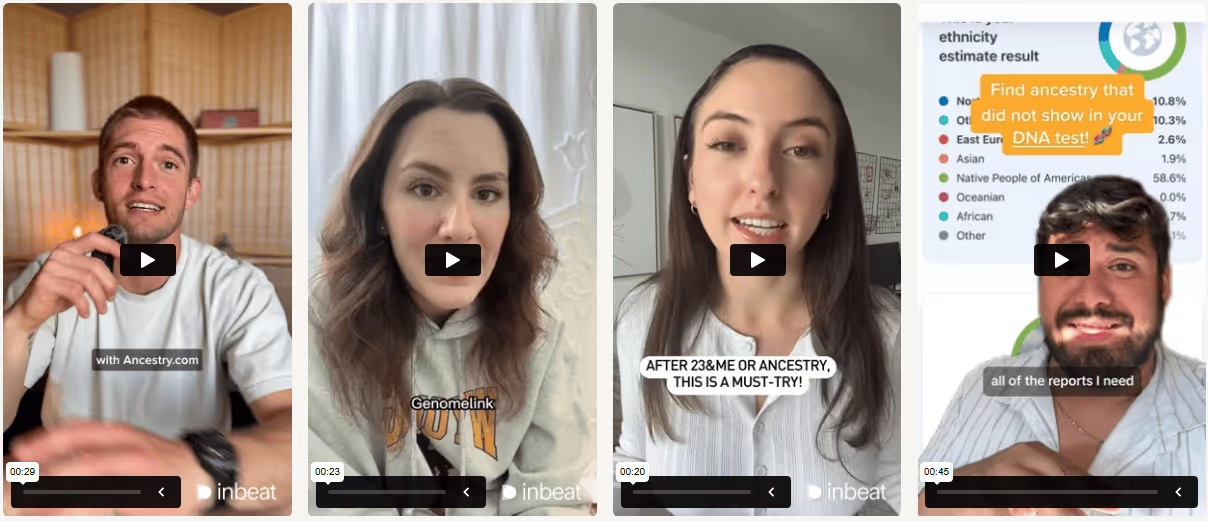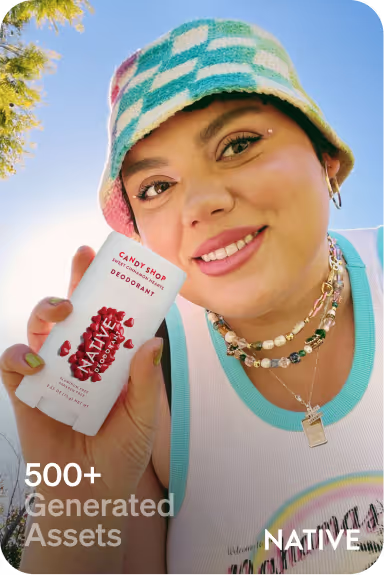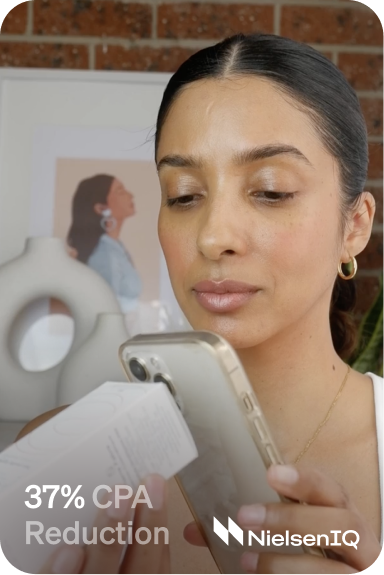According to McKinsey, businesses that actively use customer analytics are 2.6x more likely to see higher ROI and 50% more likely to outpace competitors in sales growth.
That’s huge!
Yet, many brands struggle to get there.
Why? Because in-house teams sometimes lack the bandwidth, deep expertise, or the right tools to make sense of overwhelming marketing data.
That’s where marketing analytics agencies come in. They turn raw numbers into clear, profit-driving insights.
In this blog, we’ll break down how these agencies help brands:
- What a marketing analytics agency actually does
- Key services they offer
- Why hiring an agency can outperform building an in-house team
- Real-world examples of data-driven strategies delivering big results
P.S. Struggling to figure out what’s actually working in your marketing? inBeat Agency can help. Our creator-driven, analytics-backed strategies are built to maximize performance while keeping your brand’s voice sharp and consistent. Book a free strategy call now to turn your data into real growth.
TL:DR:
Transforms raw data into insights that help businesses improve marketing performance, boost ROI, and outpace competitors.
Offers core services like campaign tracking, audience segmentation, attribution modeling, predictive analytics, budget optimization, and custom dashboards.
Enables real-time decisions with clear, visual reporting across all marketing channels using tools like GA4, Looker Studio, and Power BI.
Outperforms in-house teams by delivering deeper expertise, access to premium tools, and faster implementation, often at lower cost.
Improves marketing efficiency with data-backed strategies tailored to each brand’s audience and goals.
Delivers measurable results, as shown in inBeat Agency’s case studies with brands like Hurom, Genomelink, and Unroll.me, featuring significant drops in CPA and increases in ROAS and registrations.
Helps businesses choose the right partner by evaluating expertise, reporting style, communication, and transparency.
Supports long-term growth by aligning analytics with real business objectives and continuously optimizing based on performance.
What Is a Marketing Analytics Agency?
A marketing analytics agency helps you make sense of your marketing data so you can make smarter, data-driven decisions. They track how your digital marketing campaigns perform across channels, using tools like Google Analytics 4 and custom dashboards to spot trends, gaps, and opportunities.
Their goal is simple. Turn raw numbers into actionable insights that align with your business goals. They help improve conversion rates, manage your marketing spend, and keep your team focused on what actually drives results, without getting lost in the noise.
What Does a Marketing Analytics Agency Do
A marketing analytics agency tracks, measures, and analyzes your marketing data to show what’s actually driving results. They help optimize your digital marketing strategy, improve campaign performance, and uncover deeper insights into customer behavior. Their job is to turn complex data into clear, strategic decisions that move your business forward.
That brings us to the next point.
Key Services Offered by a Marketing Analytics Agency
So what exactly can you expect when you team up with a marketing analytics agency? Let’s look at the core services they offer.

1. Campaign Tracking & Performance Analysis
You know the saying: what gets measured gets managed.
A marketing analytics agency helps you monitor all your marketing activities, including email, social media, SEO, and paid ads, so you can see what's working and what's not.
They set up real-time dashboards that pull in key performance indicators (KPIs) from all your marketing channels.
This means you can monitor metrics like conversion rates, bounce rates, and engagement levels as they happen, which in turn allows you to make informed decisions quickly.
Pro tip: A good way to check if you found the right analytics agency is to ask them about their tech stack. In fact, marketers using five or more analytics tools are 39% more likely to see better overall results from their efforts.
With this kind of setup, you can spot trends, identify bottlenecks in your marketing funnel, and reallocate your marketing spend to areas that deliver the best return on investment (ROI).
2. Audience Insights & Segmentation
If you don’t know who you’re talking to, your message won’t hit. That’s where audience insights come in.
A good marketing analytics agency like inBeat digs into tools like GA4, Meta Insights, and your CRM to figure out exactly who your customers are, how they behave, and what they care about.
They use algorithmic segmentation to group people by value, like creating look-alike audiences, recommending the next best product, and building RFM segments.
RFM stands for Recency, Frequency, and Monetary value. It’s a way to find your most loyal, high-value customers based on how recently and often they buy and how much they spend.

And it works. 80% of companies using market segmentation say it’s helped boost their sales.
Better targeting, more personalization, and stronger ROI; it all starts with knowing your audience.
3. Attribution Modeling
Attribution modeling helps you figure out which parts of your marketing are actually driving sales.
Most folks give all the credit to the last click, like someone clicking an ad right before they buy, but that ignores all the steps that happened before, like email, social, or even a blog post.
A marketing analytics agency helps you move beyond that “last click” mindset. They use multi-touch attribution to show how each channel plays a role in the customer journey. That means you can see how everything works together instead of guessing what’s pulling the most weight.
They might also run marketing mix modeling (MMM), which examines a combination of online and offline efforts to help you make smarter budgeting calls. It helps you see the full picture and make better calls with your marketing dollars.
As Zohar Bronfman, a Forbes Councils Member, puts it:
“Today, automated data flows make it far easier to gather data from many marketing channels and information sources.…. An MMM model can estimate the likely impact on revenue or another business outcome of each of those channels, as well as those for which data isn’t readily available.” (Zohar Bronfman, Looking Back: Reinventing Marketing Mix Modeling With Machine Learning)
4. Predictive Analytics & Forecasting
Predictive analytics is like having a crystal ball for your marketing.
A good marketing analytics agency taps into AI-driven models and machine learning to look at your past data. They use that insight to forecast what’s likely to happen next, whether it’s future sales, shifts in customer behavior, or how your campaigns will perform.
This kind of forecasting helps brands plan smarter. You’ll know when to ramp up spend, where to allocate budget, and what trends to watch for.
Instead of reacting to changes, your marketing team can stay one step ahead and make decisions with confidence.
And that’s exactly what you need. In fact, companies implementing predictive analytics in their marketing strategies have seen an average 40% improvement in campaign effectiveness.
5. Budget Optimization & ROI Reporting
Nobody wants to throw money into a black hole.
A marketing analytics agency helps you figure out where to cut back and where to double down.
They look at key metrics like ROAS (return on ad spend), CPA (cost per acquisition), and CAC (customer acquisition cost) to see what’s actually delivering value.
Using real-time data, they fine-tune your bids and help your team make smarter decisions about where to spend next.
Whether it’s tweaking your ad strategy or reallocating budget across channels, every move is backed by data, not gut instinct.
In return, you get more results from your marketing dollars and a clearer view of what’s working and what’s wasting cash.
And since 64% of businesses plan their future marketing budgets on ROI from previous campaigns, it’s clear how important this kind of reporting is for staying competitive.
6. Custom Dashboards & Reporting
Let’s be honest, raw data isn’t exactly fun to sift through. That’s where custom dashboards play their role.
A marketing analytics agency builds visual reports that make your data easy to understand at a glance.
In our experience, spreadsheets can increase confusion. You need clean, clear insights your team can actually use.
Agencies like us use tools like Looker Studio, Tableau, and Power BI to turn complex metrics into simple visuals.
Tracking campaign performance, monitoring KPIs, or watching your marketing spend, no matter the focus, the dashboards are built to fit your team’s specific needs.
The best part? These dashboards help your team spot trends, catch issues early, and stay aligned with business goals without drowning in numbers.

P.S. Feeling lost in a sea of data with no clear direction? Partnering with the right analytics agency can unlock valuable insights and drive meaningful results. Explore the top data analytics agencies that can help you handle your data and achieve your business goals.
Why Hire a Marketing Analytics Agency Instead of Doing It In-House?
Building an in-house marketing analytics team might seem like a good idea, but it usually comes with higher costs and limited expertise. The majority of companies are struggling with marketing analytics, and only 22% are satisfied with their current capabilities.
Research indicates that hiring a marketing agency can be nearly 50% more cost-efficient than maintaining an in-house team.
Agencies bring a wealth of experience from working across various industries. They offer fresh perspectives that can uncover opportunities your internal team might overlook. Moreover, expert agencies have access to premium platforms and advanced analytics tools that provide deeper insights that drive better decision-making.
Partnering with an agency saves time, too. Instead of spending months recruiting and training staff, you get immediate access to a team of experts ready to hit the ground running.
In short, hiring a marketing analytics agency offers cost savings, specialized expertise, and quicker implementation. That’s why it’s a smart choice for businesses that want to optimize their marketing efforts.
How to Choose the Right Marketing Analytics Agency
Now the main question is: how do you choose the right marketing analytics agency for your team and goals?
Let’s break it down.

- Check their expertise and certifications: You want a team that knows their stuff. Look for certifications from Google Analytics, Meta, or HubSpot; these show they’re legit and up to date.
- Ask about the tools they use: Make sure they’re working with platforms like GA4, Tableau, Looker Studio, or whatever tools your team is already using or plans to use. Compatibility matters.
- Evaluate their industry experience: Agencies that understand your space, like SaaS, eCommerce, or healthcare, can deliver way more relevant insights.
- Review their reporting style: Ask to see real sample reports or dashboards. The data should be clear, visual, and aligned with your business goals.
- Ensure strong communication: Choose a partner who breaks down complex data in plain English and works closely with your team, not someone who hides behind charts.
- Ask about their approach to attribution and ROI: You want accurate multi-channel tracking and reporting that focuses on what really moves the needle.
- Look for transparency: Avoid black-box agencies that keep you in the dark. A great partner will openly share their methods, explain the results, and walk you through their optimization plans. They’ll be open about what they’re doing, what’s working, and what’s next.
Real-World Example: How inBeat Agency Delivers Results
Curious how this looks on the ground? Here’s how inBeat agency made a real difference with their data-driven approach.
1. Hurom
Hurom’s marketing team noticed rising CPAs and shrinking profits. Their old, overly promotional ads were losing impact, leading to creative fatigue.
Our team identified the key performance drivers behind user-generated content (UGC) by leveraging detailed marketing analytics. We analyzed data like hooks, calls-to-action, and social proof to find the best combinations that resonated with the audience.
The strategy shifted from constant sales pitches to health-focused messaging based on real customer concerns, such as gut and skin health. Custom dashboards tracked campaign performance in real time, enabling fast adjustments to optimize spend.
Results:
- CPA dropped by 65% thanks to targeted, data-backed creatives
- Customer acquisition cost (CAC) fell 36% through smarter budgeting and bid optimization
- ROAS increased 2.5 times as marketing dollars were spent more efficiently

2. Genomelink
Genomelink faced rising CPAs due to creative fatigue. Their old image and carousel ads just weren’t cutting it anymore, especially on fast-moving platforms like TikTok. Tight CAC targets set by leadership made it even tougher. They needed fresh, effective content, and fast.
We used marketing analytics to build a comprehensive creative testing strategy. We tracked performance across various hooks, calls-to-action, spark ads, voiceovers, and actors to figure out what clicked with the audience.
Our team created an ongoing production pipeline, always having 5 to 10 performance-tested UGC videos ready to go. More video variations meant more chances of going viral and keeping the content fresh.
Results:
- CAC dropped by 73% thanks to smarter, data-backed creative testing
- Registration completions increased by 124%
- Cost per registration fell by 27%

3. Unroll.me
When NielsenIQ re-launched Unroll.me, an inbox decluttering app, they wanted to quickly grow their user base through social media advertising. However, driving growth at scale while keeping costs low was a big challenge.
Our team developed a media-buying strategy centered around scalable user-generated content (UGC) on TikTok. Our experts kept analyzing real-time campaign data and performance metrics. That’s how we optimized creative variations and targeting to maximize efficiency.
Results:
- CPA dropped by 75%, drastically reducing acquisition costs
- Over 100,000 downloads per month were achieved
- Monthly ad spend surpassed six figures with sustainable ROI

Turn Marketing Data into Real Growth with inBeat Agency
Marketing data can be hard to handle, especially when teams are short on time or tools. That’s why many brands work with marketing analytics agencies to get clear answers, better results, and smarter strategies. If your goal is to grow with confidence, turning data into real actions is the first step.
- Marketing analytics agencies help make sense of complex data.
- They track campaign results across all major marketing channels.
- Real-time dashboards allow quick decisions and performance checks.
- Audience insights improve targeting and message accuracy.
- Attribution modeling shows which channels truly drive actions.
- Predictive analytics helps plan future marketing steps.
- Budget optimization ensures smarter use of marketing spend.
- Custom reports turn raw data into clear, useful visuals.
If you want to get more out of your marketing data, inBeat Agency can help. We always use smart strategies and clear reporting to increase results across your campaigns.
Book a free strategy call now to get started with expert support.
FAQ’s
What does an analytics agency do?
An analytics agency collects, tracks, and analyzes data to help businesses make smarter decisions and improve performance across marketing, sales, and customer experience.
What is the work of marketing analytics?
Marketing analytics focuses on measuring the success of campaigns, understanding customer behavior, and using data to improve marketing results across different channels.
What do marketing analysts do?
Marketing analysts study data from campaigns, websites, ads, and customer actions. They turn that data into insights that help teams improve strategy and reach goals faster.
What is the main goal of marketing analytics?
The main goal is to understand what’s working, what’s not, and how to get better results from your marketing efforts using clear, data-based insights.





.svg)
.svg)
.svg)
.svg)


.svg)










